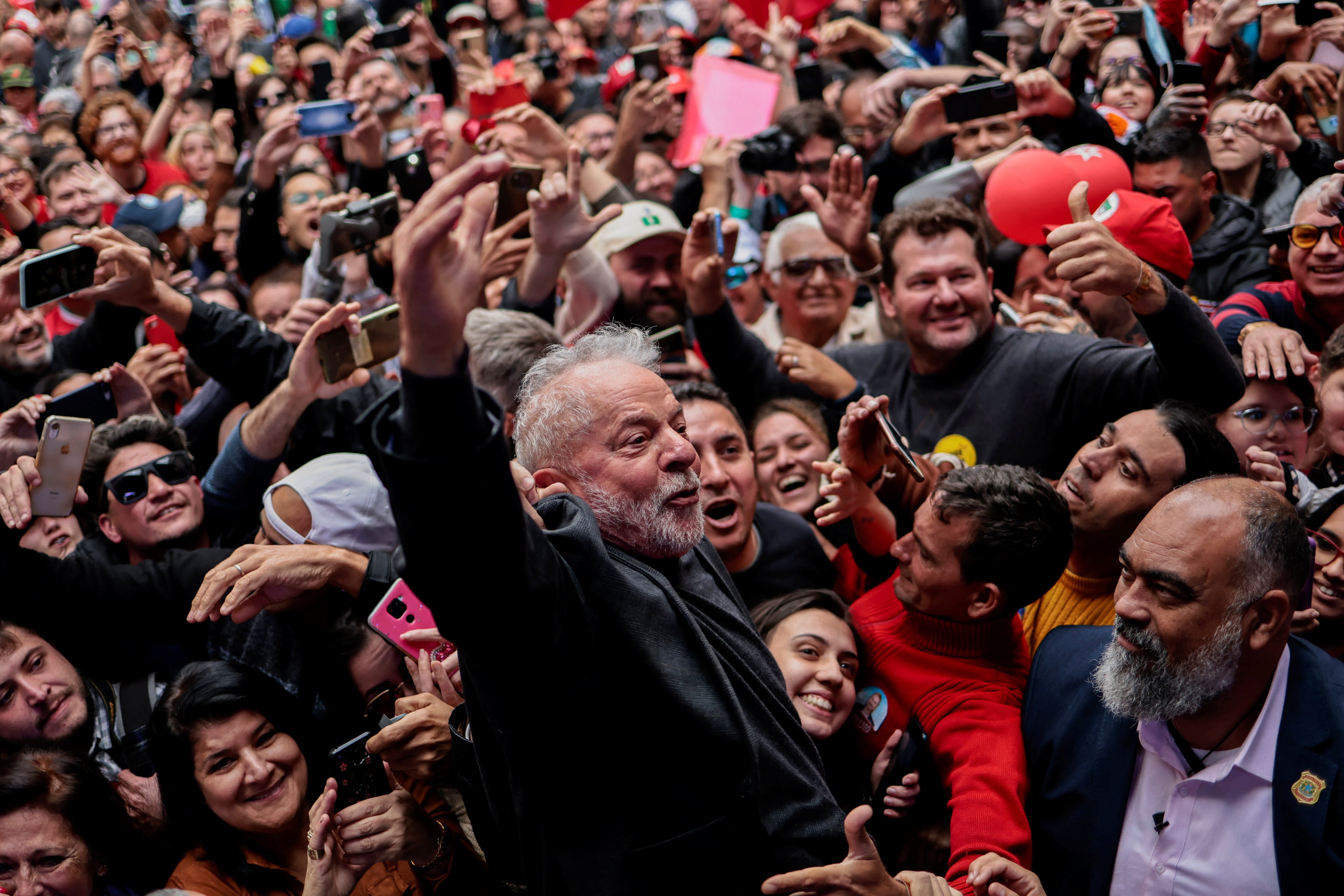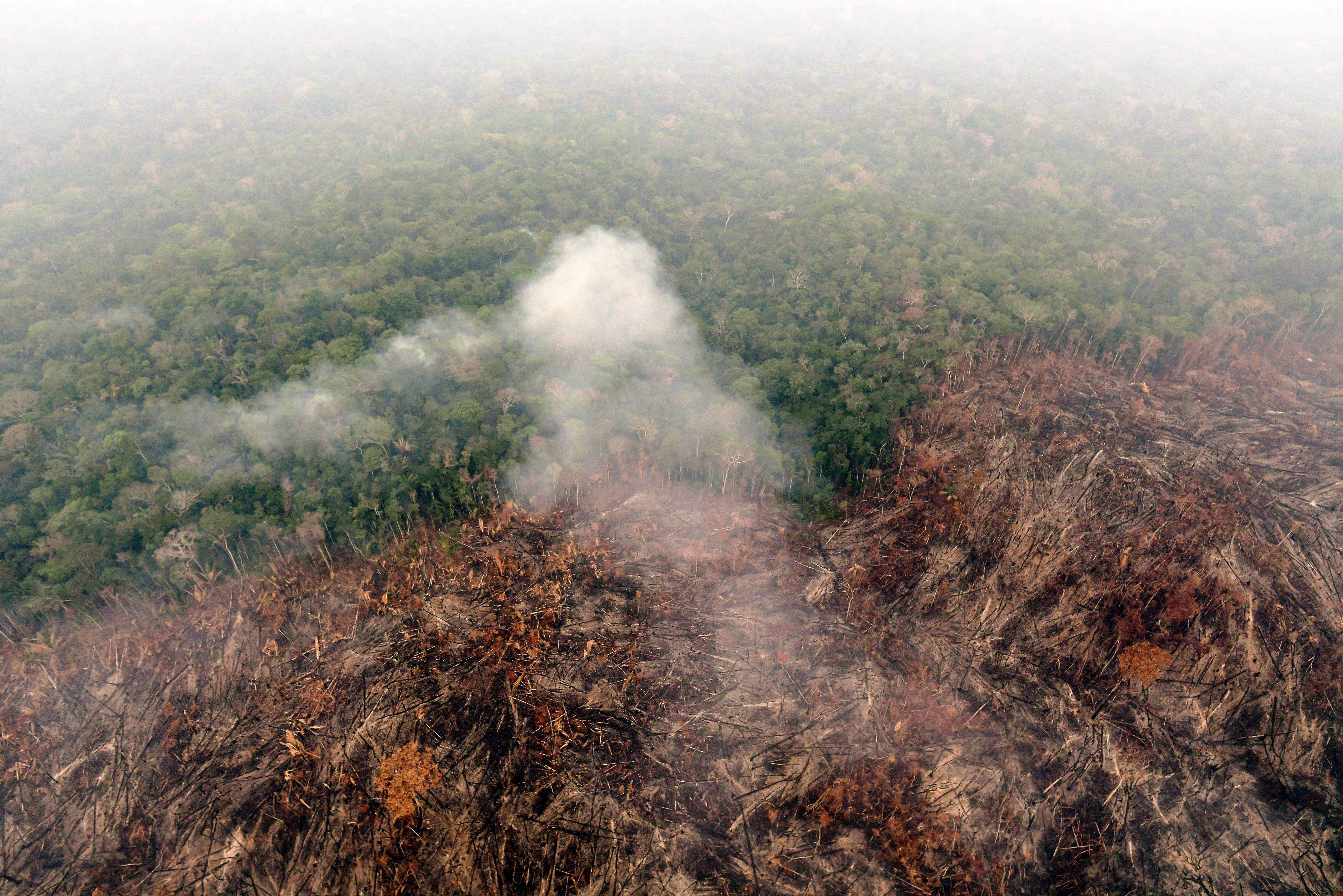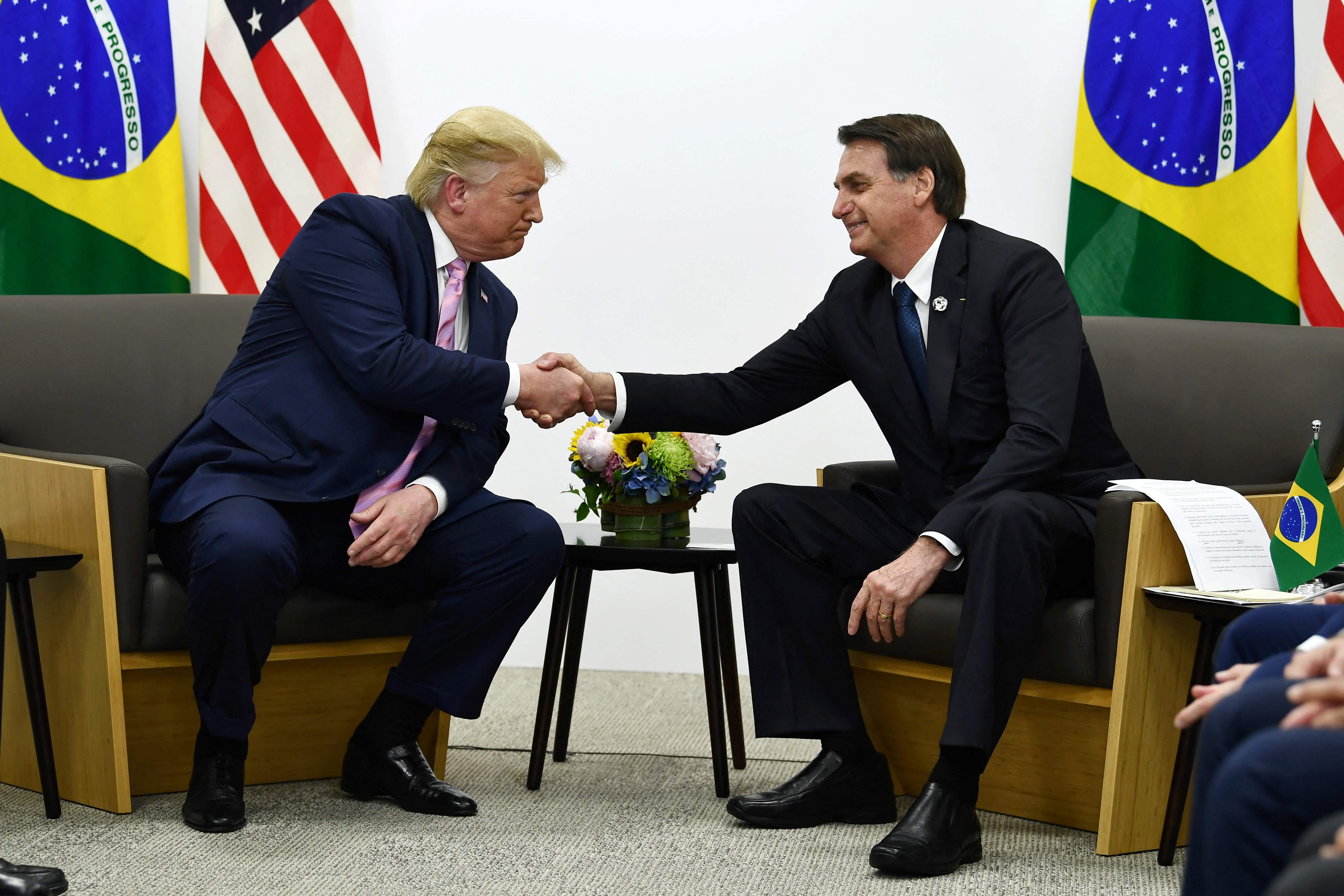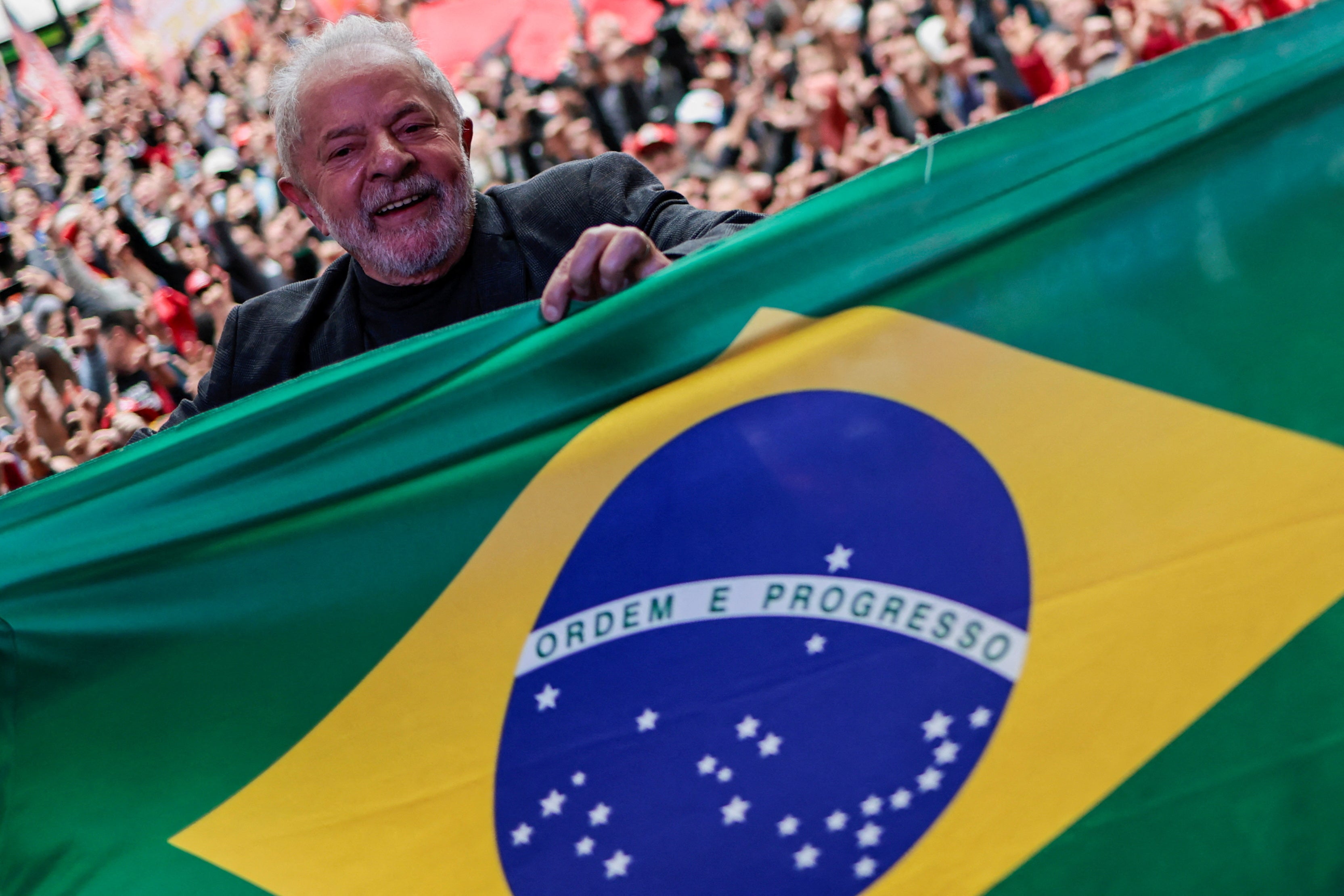From prison to presidency, Brazil’s Lula could make stunning political comeback
Brazilians vote on Sunday, picking between populist President Jair Bolsonaro and the leftist ‘Lula’ – a man who was in jail at the time of the last election, writes David Harding


It could be one of the most dramatic of all political rehabilitations.
During the last Brazilian general election in 2018, Luiz Inacio Lula da Silva was in a prison cell, serving a 12-year sentence on corruption charges as part of the “Car Wash” scandal which shook the foundations of Brazilian politics, threatened to end his career, and paved the way for the controversial, far-right Jair Bolsonaro to triumph in an unlikely victory.
This Sunday, “Lula” could be confirmed as the country’s next president and, to cap the biggest of all comebacks for the left-winger, it would be at the expense of his chief political rival, Bolsonaro in a run-off.
Whoever Brazil chooses – and it is almost certainly going to be Lula, not Bolsonaro – it will be a clear message of the political path South America’s largest country wants to take for the next four years.
Last year Brazil’s Supreme Court threw out the convictions against Lula, meaning he was eligible to run for the presidency again, and recent polling puts Lula ahead of Bolsonaro, with the latest poll from the Datafolha institute giving him 53 per cent, to Bolsanaro’s 47 per cent.
Any victory by Lula could end a period of considerable turmoil and the gravel-voiced 76-year-old former union leader, who led strikes against Brazil’s military dictatorship in the 1970s, is promising to restore political calm.
“Little Lula, peace and love, is back,” Lula has said in interviews during an election campaign unsettled by rising political violence and even the killing of some of his supporters.
But if he wins, his task to reverse the fortunes of many will be mammoth.
Like elsewhere, Brazil is faced with surging food and fuel prices, as well as an economic slowdown. An estimated 33 million people out of 217 million are in extreme poverty. Hunger is a growing issue for many.
Environmental worries loom large, especially with the world looking on to see if the management of the Amazon rainforest, where Bolsonaro has let deforestation soar to a 15-year high, will significantly alter. Lula has talked about cracking down on militias in the Amazon and making Brazil’s economy more energy sustainable.

And, as seems to be all the buzz with politicians right now, Lula has also focused on growth, but he is putting his faith in a large infrastructure programme to boost Brazil’s flagging economy. Unlike others, he is not doing it by squeezing the poorest. Instead, he has promised to increase taxes on the rich and boost public spending. He said during the campaign that he aims to put the “people in the budget”.
Internationally, he could clash with the west over Ukraine. Previously as president he was a pragmatist on foreign policy, but on the major international issue of the present time, he has blamed President Zelensky for “wanting war” and says Kyiv is as “responsible” for the conflict as Moscow, though he has said it was a mistake for Russia to invade.
His return to power, however, should at least de-toxify Brazil’s international reputation, which has worsened under Bolsonaro, who has been compared to Donald Trump and Silvio Berlusconi.
But with Lula’s likely win, his first task, perhaps his most important task of all, may well be to defuse the potentially explosive political situation if the combustible Bolsonaro carries out his threat not to recognise any defeat at the polls.
Using the Donald Trump playbook, Bolsonaro, who has also proved supremely skilful in using social media to get his message across to people, claimed that the electoral process can be easily manipulated. How his millions of supporters respond to the former army captain’s likely defeat – and a Lula victory – could determine the left-winger’s first weeks back in office. The grimmest scenario is that Bolsonaro’s supporters, including those from the military in a country where the armed forces ruled from 1964 to 1985, might not accept defeat at all.
For Brazil, like other states, it is not an era of hope and far from the optimistic times witnessed when Lula first took office.
He led the country from 2003 until 2010, a time of robust economic growth, which helped him make inroads into reducing the country’s deep social inequalities, lift millions from extreme poverty and expand access to education and healthcare.
He left office with an unprecedented 87 per cent approval rating, and as a result was described by former US president Barack Obama as “the most popular politician on Earth”.

Despite that popularity, Brazil’s constitutional rules meant he could not run for a third consecutive term.
But his legacy was tarnished by a deep recession overseen by his hand-picked successor, Dilma Rousseff, who was impeached for breaking budget rules, and that was even before Lula ended up in prison. The time in jail – Lula ended up spending 580 days in prison until being released in November 2019 – has led to many in Brazil viewing him as yet another in an extremely long line of flawed politicians.
This being Brazil, he was not unemployed during the time he was incarcerated as he also worked as a television pundit from his cell during the 2018 World Cup. Lula is well-known for being a big football fan, and supports Sao Paolo club Corinthians.
For many in Brazil though, he remains a saviour, especially when held up against Bolsonaro. Lula would probably have won the 2018 election against the same opponent, were it not for the fact he was not allowed to run as he was in jail.
Once feared by many on the right in Brazil as a fiery trade unionist – his first job was a metal worker and he lost the little finger on his left hand at 19 in an industrial accident – he has also proved himself a pragmatist on the domestic scene.
Lula’s success in his first two terms as president and his re-emergence from jail as a politician vowing to fight rising hunger and unemployment, while channelling credit into key industries to create jobs and restore solid growth, has seen him claim wide appeal, even if many of those supporting Bolsonaro regard him with suspicion at the very least.

The mayor of Rio de Janeiro, centre-right Eduardo Paes, recently called Lula Brazil’s greatest living politician, who “embodies hope”.
“Vote for whoever you want, so long as you vote Lula,” he told his supporters.
This time, he has forged a broad centre-left coalition of 10 parties while reaching out to business leaders and former enemies. He has sought to reassure Brazil’s business community he is fiscally responsible and has promised to attract foreign investment.
For a running mate, Lula has chosen his rival from the 2006 election, former Sao Paulo governor Geraldo Alckmin, whose moderate views have reassured some investors that Lula will avoid extreme state intervention in the economy.
Lula has compared himself to Nelson Mandela and Mahatma Gandhi, as well as Martin Luther King during the campaign, as examples of politicians and leaders who went on to flourish and have real influence after leaving prison. Lula has also played on his humble beginnings, of the fact that he could not read until he was 10 years old.

After leaving office in 2010, he was diagnosed with throat cancer. He even shaved off his trademark beard – now back – during treatment. Doctors declared him cured of the disease in 2012.
His wife, Marisa Leticia da Silva, died in February 2017 after suffering a brain haemorrhage. Last year he remarried, to sociologist Rosangela da Silva, known as Janja. His first wife died of hepatitis in 1971 while pregnant and the baby also died.
In a campaign advert this time round, Lula says he has no time for regrets.
“I have lived a full life. I have no time for hatred or revenge. I only have time to believe that tomorrow will be a better day,” he said.






Join our commenting forum
Join thought-provoking conversations, follow other Independent readers and see their replies
Comments